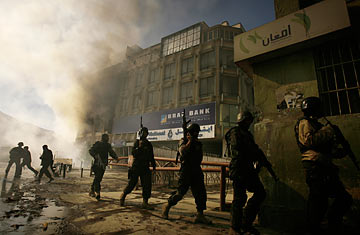
Afghan security forces appear at the scene of a brazen attack by the Taliban in central Kabul
A Taliban suicide squad may have wrought mayhem during a four-hour shoot-out in the heart of his capital on Jan. 18, but that won't stop Afghan President Hamid Karzai from offering the movement's fighters a reconciliation deal. Karzai plans to use next week's Afghanistan donor conference in London to unveil an upgraded and, he hopes, better-funded plan to offer Taliban fighters not simply amnesty but also jobs, pensions, farmland and security from retribution in exchange for laying down their weapons. The program carries the support of the U.S., which is all too aware that the Taliban is unlikely to be vanquished on the battlefield and that ending the war depends on most of those currently fighting in Taliban ranks being convinced that they have more to gain by putting down their weapons.
Karzai is even offering to hold direct talks with the Taliban leadership, and proposed removing Mullah Omar and others from a U.N. list of terrorism suspects. His representatives have reportedly been secretly negotiating with Taliban figures in talks arranged by Saudi Arabia, though with no breakthrough. The Taliban continues to insist on the withdrawal of foreign forces from Afghanistan as a precondition for peace. Pakistan is also discreetly offering to broker talks between the Americans and the Taliban leadership.
The U.S., however, is skeptical about any effort to reach out to the movement's leadership right now. Even if some form of reconciliation with those who once sheltered Osama bin Laden were possible, U.S. officials believe it won't happen as long as the Taliban thinks its fighters are winning the war. At the moment, Karzai would be seen as offering negotiations from a position of weakness. As the U.S. commander on the ground, General Stanley McChrystal, warned last year, it is the insurgents who have the momentum. Indeed, the purpose of McChrystal's planned troop surge is to halt and reverse that momentum and to stop the Taliban from gaining control of urban areas. Monday's attack in the capital, the most audacious since U.S. forces invaded in late 2001, underscored the depth of that challenge. But those inclined toward optimism might take heart from the fact that the attack was largely contained — and the damage minimized — by Afghan security forces fighting without much help from foreign troops.
The U.S. is hoping that Karzai's outreach effort can peel away many of the ideologically uncommitted Pashtun fighters who are commonly referred to by U.S. officials as "$10 a day" Taliban because they're paid for their services. U.S. officials believe that as much as 70% of the Taliban's fighting forces is not ideologically motivated and could be bought off, though that view is deemed highly optimistic by some observers. Still, by offering Taliban fighters an economic livelihood, pensions and security from reprisals, the Afghan government hopes that many of those fighting in Taliban ranks can be neutralized.
But the program faces major hurdles. It's a tough sell even to uncommitted foot soldiers as long as the Taliban appears to be winning, and some observers fear that the program will have limited appeal until the U.S. and its coalition allies reverse the trend on the battlefield. Then there are concerns over whether the Karzai government, hardly competent at the best of times and mired in political chaos since last August's election, will be capable of effectively administering a program as ambitious as one involving bringing hundreds of Taliban fighters into a secure welfare net — and managing the potential backlash from villagers who have refrained from joining the Taliban's fight and might resent seeing those who did lavishly rewarded.
Karzai's popularity remains low, yet he is all the U.S. and its allies have by way of a political partner in Afghanistan. Monday's attack occurred as the President was swearing in a few more members of the Cabinet he's trying to appoint. The parliament rejected 17 of the 24 names that Karzai put forward two weeks ago; on Jan. 16, it rejected 10 of the 17 names that were on his second slate. That, and a U.N. report released on Jan. 19 estimating that Afghans had to pay about $2.5 billion in bribes to officials over the past year (the equivalent of one-quarter of the country's GDP), underscores an epic lack of confidence in a regime that will be reaching out to offer Taliban fighters amnesty.
The main obstacle confronting the reconciliation program, however, may simply be security. It's far from clear whether the Afghan government and its coalition backers will be able to ensure the security environment necessary to persuade those who are fighting under the Taliban banner to switch sides without fear of retribution. After all, the insurgents have over the past year demonstrated that, if anything, they have a greatly expanded operational reach — a fact underscored by Monday's strike in the capital. Putting former insurgents on the government payroll certainly helped stabilize Iraq (though that stability may be undermined by continued sectarian politicking there), and McChrystal and Karzai will be hoping that it could have a similar effect in Afghanistan. But before that proposition can be tested, there will be months or even years of bitter fighting to change the balance of forces on the ground.
